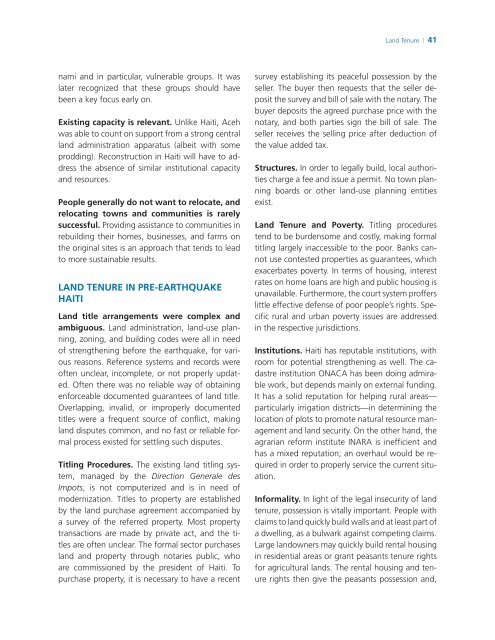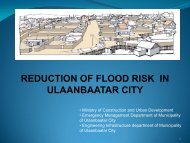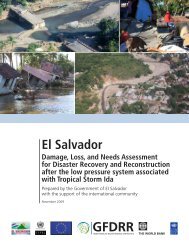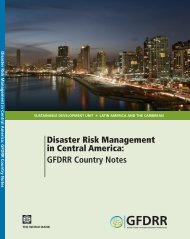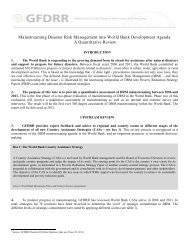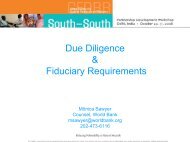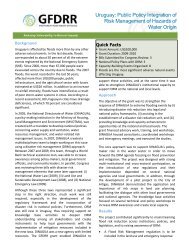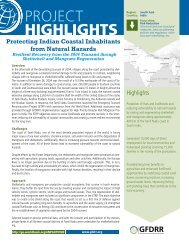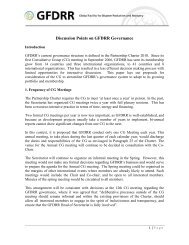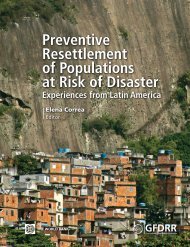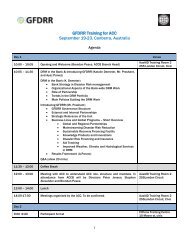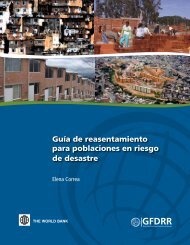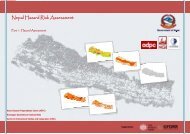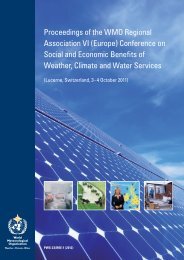Haiti Earthquake Reconstruction Knowledge Notes from ... - GFDRR
Haiti Earthquake Reconstruction Knowledge Notes from ... - GFDRR
Haiti Earthquake Reconstruction Knowledge Notes from ... - GFDRR
You also want an ePaper? Increase the reach of your titles
YUMPU automatically turns print PDFs into web optimized ePapers that Google loves.
Land Tenure | 41<br />
nami and in particular, vulnerable groups. It was<br />
later recognized that these groups should have<br />
been a key focus early on.<br />
Existing capacity is relevant. Unlike <strong>Haiti</strong>, Aceh<br />
was able to count on support <strong>from</strong> a strong central<br />
land administration apparatus (albeit with some<br />
prodding). <strong>Reconstruction</strong> in <strong>Haiti</strong> will have to address<br />
the absence of similar institutional capacity<br />
and resources.<br />
People generally do not want to relocate, and<br />
relocating towns and communities is rarely<br />
successful. Providing assistance to communities in<br />
rebuilding their homes, businesses, and farms on<br />
the original sites is an approach that tends to lead<br />
to more sustainable results.<br />
LAND TENURE IN PRE-EARTHQUAKE<br />
HAITI<br />
Land title arrangements were complex and<br />
ambiguous. Land administration, land-use planning,<br />
zoning, and building codes were all in need<br />
of strengthening before the earthquake, for various<br />
reasons. Reference systems and records were<br />
often unclear, incomplete, or not properly updated.<br />
Often there was no reliable way of obtaining<br />
enforceable documented guarantees of land title.<br />
Overlapping, invalid, or improperly documented<br />
titles were a frequent source of conflict, making<br />
land disputes common, and no fast or reliable formal<br />
process existed for settling such disputes.<br />
Titling Procedures. The existing land titling system,<br />
managed by the Direction Generale des<br />
Impots, is not computerized and is in need of<br />
modernization. Titles to property are established<br />
by the land purchase agreement accompanied by<br />
a survey of the referred property. Most property<br />
transactions are made by private act, and the titles<br />
are often unclear. The formal sector purchases<br />
land and property through notaries public, who<br />
are commissioned by the president of <strong>Haiti</strong>. To<br />
purchase property, it is necessary to have a recent<br />
survey establishing its peaceful possession by the<br />
seller. The buyer then requests that the seller deposit<br />
the survey and bill of sale with the notary. The<br />
buyer deposits the agreed purchase price with the<br />
notary, and both parties sign the bill of sale. The<br />
seller receives the selling price after deduction of<br />
the value added tax.<br />
Structures. In order to legally build, local authorities<br />
charge a fee and issue a permit. No town planning<br />
boards or other land-use planning entities<br />
exist.<br />
Land Tenure and Poverty. Titling procedures<br />
tend to be burdensome and costly, making formal<br />
titling largely inaccessible to the poor. Banks cannot<br />
use contested properties as guarantees, which<br />
exacerbates poverty. In terms of housing, interest<br />
rates on home loans are high and public housing is<br />
unavailable. Furthermore, the court system proffers<br />
little effective defense of poor people’s rights. Specific<br />
rural and urban poverty issues are addressed<br />
in the respective jurisdictions.<br />
Institutions. <strong>Haiti</strong> has reputable institutions, with<br />
room for potential strengthening as well. The cadastre<br />
institution ONACA has been doing admirable<br />
work, but depends mainly on external funding.<br />
It has a solid reputation for helping rural areas—<br />
particularly irrigation districts—in determining the<br />
location of plots to promote natural resource management<br />
and land security. On the other hand, the<br />
agrarian reform institute INARA is inefficient and<br />
has a mixed reputation; an overhaul would be required<br />
in order to properly service the current situation.<br />
Informality. In light of the legal insecurity of land<br />
tenure, possession is vitally important. People with<br />
claims to land quickly build walls and at least part of<br />
a dwelling, as a bulwark against competing claims.<br />
Large landowners may quickly build rental housing<br />
in residential areas or grant peasants tenure rights<br />
for agricultural lands. The rental housing and tenure<br />
rights then give the peasants possession and,


